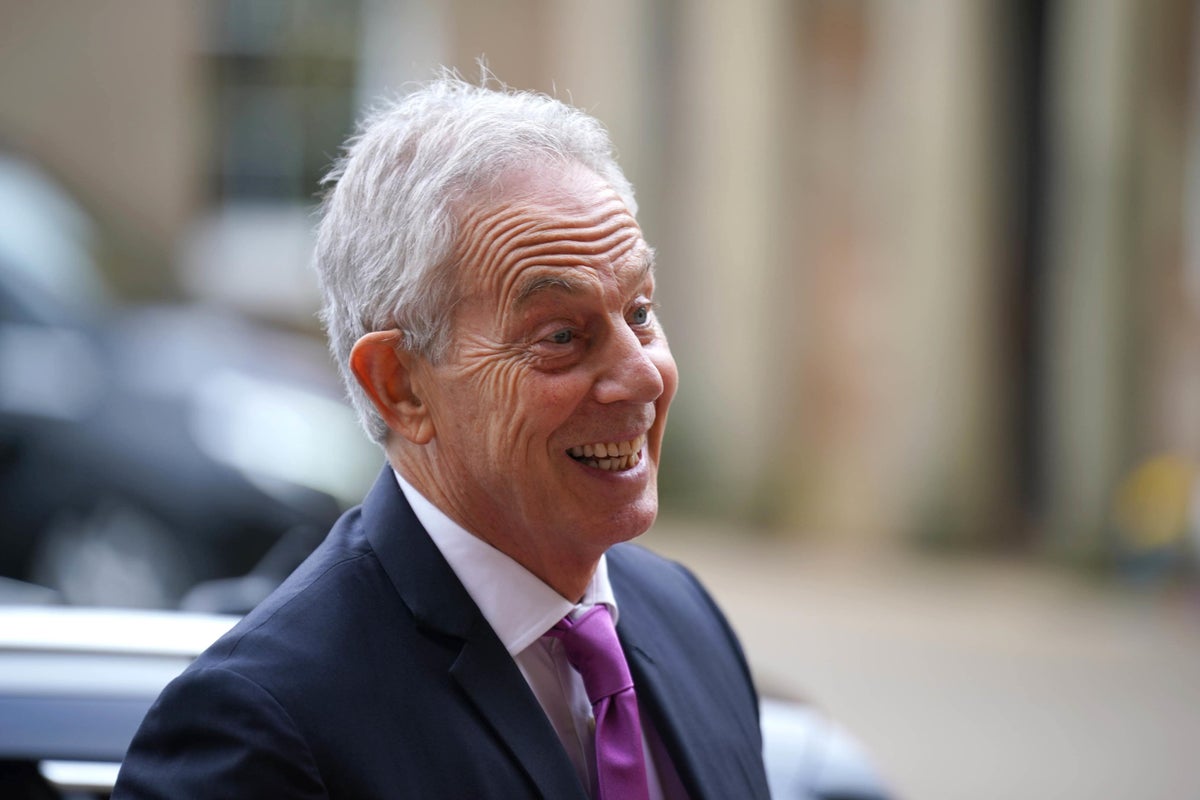
The institutions of the Good Friday Agreement need to be continually worked to secure them for the future, Sir Tony Blair said.
The former prime minister is joining other political leaders from Northern Ireland’s peace process era at a major conference commemorating the Good Friday Agreement.
Ex-US president Bill Clinton and former taoiseach Bertie Ahern will also participate in the three-day event, at Queen’s University in Belfast, 25 years on from the landmark accord.
Senator George Mitchell, who chaired the peace negotiations in 1998, will take part as well.
Former US secretary of state Hillary Clinton is hosting the conference as part of her role as chancellor at Queen’s.
Prime Minister Rishi Sunak and Taoiseach Leo Varadkar are due to attend later in the week.
The agreement largely ended Northern Ireland’s 30-year sectarian conflict.
Sir Tony told the BBC there are people alive today because of the peace deal.
When you look back over this 25 years, from time to time we have had that same energy, from time to time we haven’t— Sir Tony Blair
He said: “But I am the first to say it takes a long time for the mistrust to disappear, for the institutional arrangements to make full sense to people, and you’ve got to work at it the whole time.”
He added: “When you look back over this 25 years, from time to time we have had that same energy, from time to time we haven’t.
“But you’ve got to keep it and you’ve got to work at it all the time if you want it to be secure for the future.”
Sir Tony remembered being criticised when he first met with former Sinn Fein leaders Gerry Adams and Martin McGuinness and with loyalist leaders.
He said: “But the reality is – and this is what is so important about politics for the future – if everyone had just stuck in their positions and said, ‘As a result of doing things which are unjustified in the past, we are not prepared to talk,’ we would never have had the Good Friday Agreement. We would never have made progress.
“So the important lesson is: progress only comes when people in positions of power are prepared to take decisions that are difficult, that are going to be controversial, that are going to be highly criticised, but where in the end you believe there is a better and higher purpose that can be achieved by this engagement.”
The settlement created powersharing institutions at Stormont that involved nationalists and unionists governing Northern Ireland together in a mandatory coalition arrangement.
While the pact largely ended the Troubles, which had claimed more than 3,600 lives since the late 1960s, it has failed to bring long-term political stability in the region and devolution has collapsed several times in the last two decades.
The anniversary comes amid another period of collapse, with the DUP blocking powersharing in protest at post-Brexit trading arrangements that have created economic barriers between Northern Ireland and Great Britain.
The barriers were first introduced under the Withdrawal Agreement’s contentious Northern Ireland Protocol.
The UK and EU recently agreed the Windsor Framework as a way to cut the red tape created by the protocol.
While the DUP says the framework has gone some way to address its concerns about the protocol, it says significant problems remain.
The party has opposed the framework at Westminster and has made clear its boycott of Stormont will continue until it secures further assurances from the UK government over its concerns around sovereignty and the application of EU law in Northern Ireland.
Mr Ahern said barriers were broken down to secure the Good Friday Agreement in 1998.
He told the BBC: “We had the right mix of people and because we were at it night and day for eight or nine months, if not for a number of years before that.
“We knew this wasn’t going to be perfect, but there was a feeling with the help of the European Union, with the help of Bill Clinton and the Americans, the fact that all the parties were getting on reasonably well, we had broken down the barriers.”
The former Irish premier said it is disappointing US President Joe Biden was unable to address the Stormont Assembly during his visit to Northern Ireland last week.
He said: “Yeah, no doubt about it, that would have been a great thing around the world.
“That would have been a really, really powerful shot and position and speech from Stormont and unfortunately that didn’t happen.
“Anyone who comes in and says they don’t regret that isn’t telling the truth.”
Several events took place over the weekend ahead of the conference’s start.
On Sunday evening, a special dinner was held at Hillsborough Castle to mark the contribution to the peace process by the late Mo Mowlam, who was Northern Ireland Secretary in 1998.







